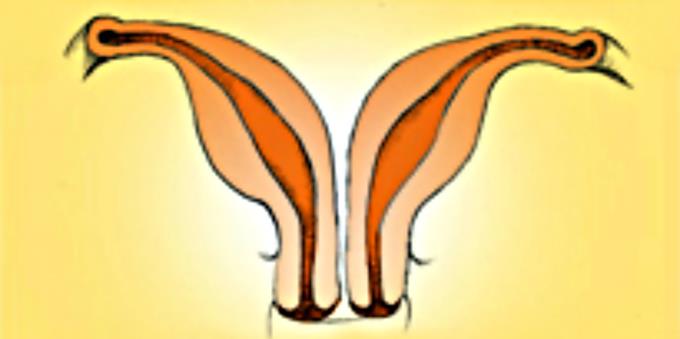Some women have an abnormality in the uterus of shape or structure relative to the normal uterus. This is called an uterine abnormality, a uterine abnormality or an uterine abnormality.
All the uterine abnormalities are more or less affecting the ability to get pregnant, even causing infertility . The experts have statistics that 1/13 women difficult to conceive is due to problems related to abnormalities in the uterus. Depending on how much of a uterine abnormality you are likely to become pregnant, the extent to which pregnancy complications can occur. Therefore, you need to follow the instructions of your doctor to improve your fertility and have a good pregnancy health.
What is the uterus?
The uterus (also known as the womb) is a pear shaped organ located in the pelvic region. The uterus size is usually 7.5cm long, 5cm wide and 2.5cm deep. The structure of the uterus includes the base of the uterus, the body of the uterus and the cervix.
Some women may have a uterus that differs from this shape or structure due to uterine abnormalities or uterine malformation. According to BabyCentre , 1 out of 18 women will experience this unusual condition.
Common uterine abnormalities
Abnormal uterus is detected only when you go to the gynecological examination, antenatal check with imaging diagnosis. Learn about uterine abnormalities to see how you are likely to become pregnant, as well as the possible risks and complications of pregnancy for a safe, healthy pregnancy.
1. There is no uterus
This abnormality is very rare, occurring only 1 / 4,000 - 10,000 women. The majority of people with these defects often have no uterus or uterus that is too small, has no vagina or very short vagina, has no menstrual periods, but still has ovaries. The ovaries are functioning normally, so the sex characteristics are still developing like the average person. Not having a vagina or having a very short vagina will make it difficult to have sex . However, this problem can be overcome with plastic surgery.
Without a uterus, you won't be able to get pregnant. Currently, advanced medicine has not been able to implement artificial uterine transplantation, so if you want to have a baby, you must ask a pregnant woman to help you .
2. The uterus is dome-shaped

The uterus is a mild uterine abnormality when the base of the uterus is slightly concave. If you have an arched uterus that can be easily confirmed by ultrasound imaging or MRI .
Usually the base of the uterus is flat or slightly convex, but when a domed uterus is encountered, the muscle of the base of the uterus spills over into the lumen and may form a small cushion. This is a common uterine abnormality and has little to do with reduced fertility risk.
However, there are some views that the uterine muscle vaulted related risk of miscarriage , premature birth .
3. The uterus has a septum

This abnormality occurs when the uterus is divided by a septum. This septum may extend from the base to only one uterine element or sometimes as far back as the cervix (complete septum).
Your uterus has either partial or full septum that can affect your ability to become pregnant. This is because a narrowed uterus puts you at a higher risk of miscarriage, poor fetal development or premature birth. If this is the case, your doctor will order you to have a normal hysterectomy before you become pregnant.
4. Two-horned uterus

The bipedal uterus is an abnormal shape and structure of the uterus. Instead of having an upside-down pear shape like a normal uterus, the bipedal uterus is shaped like a heart, so it is also called a heart-shaped uterus. Because of the limited volume of the uterus, during pregnancy you are at a higher risk of miscarriage, fetal growth delay or premature birth.
This abnormality is found more often in women with a high history of miscarriage.
5. Twin uterus

The twin uterus is a rare uterine abnormality that occurs when the uterus has two separate uterine chambers, each with its own cervix and vagina. This means that you have two separate uterus and two vagina and two fallopian tubes.
With pregnant women with a twin uterus, the artery branches nourishing the fetus will be dispersed, the uterus is narrow, the uterus is not dilated easily leading to miscarriage, fetal growth retardation or stillbirth, premature birth. .
Women with a twin uterus are often ordered to have a cesarean section because the low-lying uterus blocks the baby's way out of the vagina.
6. The single uterus or uterus

Single-horned uterus or uterus is the name for a type of uterine malformation in its unusual shape. This abnormality causes the uterus to be about the size of a normal uterus and has only one fallopian tube. Research on the unicorn uterus shows that this condition can lead to a decrease in the ability to conceive naturally because you may still have two ovaries, but only one can insert an egg into the uterus for the process. conception . Most people with a single-horned uterus get assisted reproductive by sperm pump or in vitro fertilization .
This uterine abnormality is quite rare and is often found in women with a history of repeated miscarriages.
How does an abnormality in the uterus affect pregnancy?

If the abnormality in your uterus is not too severe and is just a little different from your normal uterus, you may be able to become pregnant. In fact, being able to get pregnant depends on many factors and how abnormal your uterus is or how abnormal it is.
Except for the absence of a uterus, all uterine abnormalities have a high risk of difficult to conceive spontaneously, miscarriage, delayed fetal development, premature birth ... In addition, during pregnancy, the often in the uterus can also cause premature rupture of membranes or painful cramps.
Having uterine abnormalities often puts pressure on your cervix and may not be enough to hold the baby. During pregnancy, if your cervix opens too soon, you could experience a miscarriage or go into labor early. Your doctor will prescribe you to rest in combination using the method of cervical stitching so that your baby can stay in your womb longer.
The deformity of your uterus means that the fetal position in the uterus is not favorable (buttocks, horizontal throne ...), which is detrimental to natural delivery. The possibility that the doctor will appoint you to have a cesarean section to limit obstetric complications for both mother and baby is very high.
How to detect uterine abnormalities?

If you have fertility problems such as difficulty conceiving , repeated miscarriages, or show signs of being nearing birth before 37 weeks, talk to your doctor. Your doctor will order you to do tests to find out if the cause is related to the uterus or fallopian tubes. The methods include:
3D ultrasound to find anomalies.
Magnetic resonance imaging (MRI): This is the best way to detect abnormalities. MRI is only done if you are not pregnant.
Laparoscopy and hysterosalpingography (HSG) are special X-rays with a dye to determine if the uterus and fallopian tubes are actually working.
What is the treatment for uterine abnormalities?

Not all uterine malformations need treatment, and treatment can increase the risk of difficulty getting pregnant. Therefore, you need to follow your doctor's orders and discuss carefully with your doctor for the best option.
For example, when your uterus has a septum, having an open surgery to remove the septum can damage the lining of the uterus (scarring), reducing fertility. Your doctor may prescribe you to remove the septum with a laparoscopic surgery through the vagina. This method is not invasive, so it is less harmful to the uterus, but does not increase the likelihood of pregnancy.
Coping with uterine abnormalities during pregnancy

If you know you have a uterine abnormality, you may feel anxious about your pregnancy, especially if you have had a miscarriage before. At this time, see a specialist soon for support as soon as possible and always follow your doctor's orders to ensure the health of both you and your baby.
In addition, make sure you are familiar with the signs of early labor or the possible complications of pregnancy in order to promptly visit medical facilities for the earliest intervention by a doctor.
Hopefully, with the above information, you will understand more about your health and soon receive good news as you wish.




















